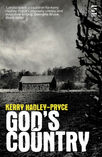PSYCHOGEOGRAPHY and being OUT OF PLACE
- Kerry Hadley
- Sep 16, 2020
- 2 min read
I've been reading about 'Wounded Landscapes' or 'Traumascapes' which have, in the past, related to places where terrorist activities have taken place and/or tragedies have happened.

Of course, the Black Country suffers and licks its post-industrial wounds anyway, but add the lockdown culture we're living in now, and let's see what that might do to research concerning psychogeography - a phenomenon requiring experience of the open space. I'm interested in the repeated chorus of the phrase the 'new normal', which suggests a need for people to have a knowable routine (which they refer to as 'normality' despite the idea that this might not remain constant.) Clarke, Murphy & Lorenzoni (2018:82) say this: 'Both physical and social attributes of place are interconnected and mutually reinforce place attachment processes.' and, according to Tigger-Rossand & Uzzell (1996:207-8) '...having control, or not, over the maintenance and continuity of place is important for psychological well-being [because] unwanted personally uncontrollable change in the physical environment, resulting in the loss of principle continuity may cause a grief or loss reaction.' I'm struck by how this links to ideas of psychogeography, of how the observation of out-of-placeness is a feature of psychogeography itself (take, for example that rogue apostrophe and idiosyncratic use of capitals, above...)
If I try and connect this to 'God's Country', when Guy returns to the Black Country, he is returning to an 'old normal', a place whose cultural, historical and linguistic make-up hasn't changed, but is about to. He has become 'other, but Donna, Flood and Greebo are also about to become that.
The drifter becomes one who 'remakes the city in accordance with his own imagination.' (Coverley 2010:71) and my descriptions of Guy wandering about his old Black Country tries to demonstrate that. DeCerteau says of the drifter, 'The voyeur-God created by this fiction...must disentangle himself from the murky intertwining daily behaviours and make himself alien to them.' (2002:93) This is what Guy does, or is trying to do.
BUT, psychogeography challenges fixed ideas about place. In The Art of Wandering. The Writer as Walker, Coverley recounts Rousseau's attitude to the act of walking as 'an escape mechanism, a means of evading a society which is seen as wholly malevolent.' (Ebook loc. 295) I'm wondering if there is a link between malevolence, wounded landscapes and the 'new normal'.









Comments